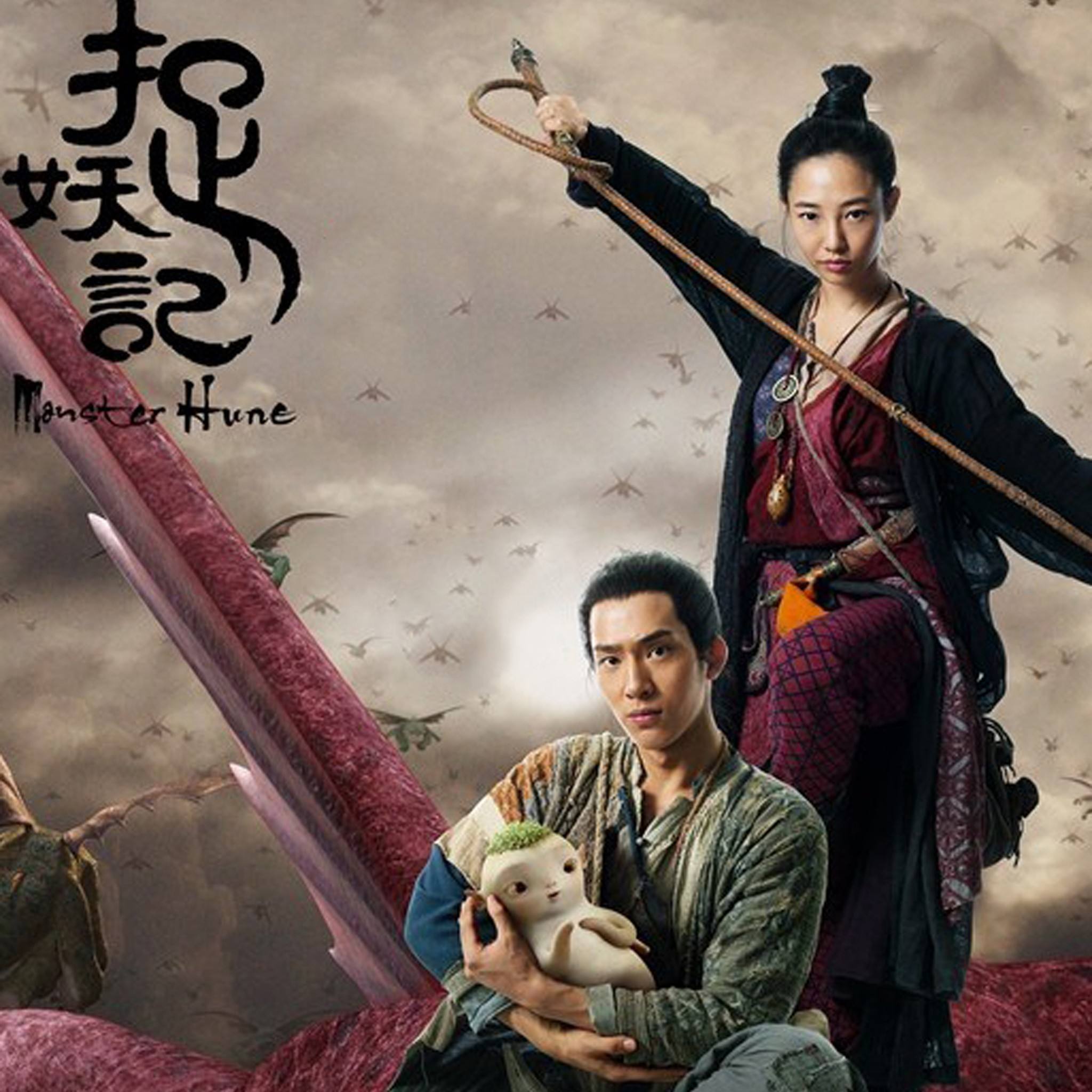Title: 捉妖记 (Monster Hunt)
Director: Raman Hui (许诚毅)
Screenwriter: Alan Yuen (袁锦麟)
Original Language: Chinese
Release Date: July 16, 2015
Genre: Fantasy, Adventure, Comedy
Running Time: 117 minutes
Main Cast:
- Bai Baihe (白百何) as Huo Xiaolan
- Jing Boran (井柏然) as Song Tianyin
- Wu Jiang (吴江) as Luo Gang
- Elaine Jin (金燕玲) as Grandma
- Eric Tsang (曾志伟) as Ge Qianhu
- Sandra Ng (吴君如) as Ying Bao
- Wallace Chung (钟汉良) as Boss
- Tang Wei (汤唯) as Zhu Jinzhen
Overview
“捉妖记” (“Monster Hunt”) is a Chinese fantasy adventure film that blends comedy, action, and heartwarming moments to create an enchanting cinematic experience. Directed by Raman Hui, known for his work on “Shrek the Third,” the film features an ensemble cast led by Bai Baihe and Jing Boran. “Monster Hunt” is set in a whimsical world where humans and monsters coexist, albeit not always peacefully. The film’s engaging storyline, impressive visual effects, and strong performances have made it a significant success in Chinese cinema, becoming a cultural phenomenon and spawning a sequel.
Plot Summary
A World of Monsters and Humans
“Monster Hunt” is set in a mythical world where monsters and humans coexist. However, tensions run high between the two species, with humans often hunting monsters out of fear and misunderstanding. The story begins with the peaceful monster kingdom being overthrown by an evil monster king, forcing the pregnant monster queen to flee and find refuge in the human world.
The Unlikely Heroes
Huo Xiaolan (Bai Baihe), a fierce and skilled monster hunter, and Song Tianyin (Jing Boran), the timid village mayor, are the film’s central characters. Their paths cross when the monster queen entrusts Tianyin with her unborn child to protect it from the evil forces pursuing her. Xiaolan, initially motivated by a bounty, agrees to help Tianyin, and the two embark on a perilous journey to keep the baby monster safe.
Baby Wuba and the Journey
The baby monster, Wuba, hatches from an egg and quickly becomes the heart of the story. Wuba’s innocence and cuteness win over Xiaolan and Tianyin, who develop a deep bond with him. Their journey is fraught with danger as they encounter various monsters and human hunters. Along the way, they are pursued by Luo Gang (Wu Jiang), a relentless and formidable monster hunter.
Climax and Resolution
The climax of the film sees Xiaolan, Tianyin, and their allies facing off against the evil monster king and his minions in a final battle to protect Wuba. Through teamwork, bravery, and the bonds they’ve formed, they manage to defeat the antagonists and restore peace. The film concludes with Wuba safely hidden in the human world, hinting at further adventures to come.
Cast and Performances
Bai Baihe as Huo Xiaolan
Bai Baihe delivers a strong performance as Huo Xiaolan, bringing a mix of toughness and vulnerability to the character. Known for her versatility in both comedic and dramatic roles, Bai Baihe’s portrayal of Xiaolan captures the character’s evolution from a bounty-driven hunter to a protector who deeply cares for Wuba.
Jing Boran as Song Tianyin
Jing Boran’s portrayal of Song Tianyin is endearing and heartfelt. As the reluctant hero, Tianyin’s journey from a timid village mayor to a brave protector is convincingly portrayed. Jing Boran’s chemistry with Bai Baihe and his ability to balance humor with emotional depth contribute significantly to the film’s charm.
Wu Jiang as Luo Gang
Wu Jiang’s performance as the relentless monster hunter Luo Gang adds intensity to the film. His character’s determination and skills make him a formidable antagonist, and Wu Jiang’s portrayal ensures that Luo Gang is both feared and respected.
Supporting Cast
The supporting cast, including Elaine Jin as Grandma, Eric Tsang as Ge Qianhu, Sandra Ng as Ying Bao, Wallace Chung as Boss, and Tang Wei as Zhu Jinzhen, contribute to the film’s richness. Each actor brings their unique flair to their roles, enhancing the film’s humor and emotional resonance.

Themes and Philosophical Questions
“Monster Hunt” explores several themes and philosophical questions that resonate with audiences. Some of the key themes include:
Coexistence and Understanding
The film delves into the theme of coexistence and understanding between different species. The initial fear and hostility between humans and monsters are gradually replaced by mutual understanding and cooperation, highlighting the importance of empathy and open-mindedness.
Family and Loyalty
The bond between Xiaolan, Tianyin, and Wuba exemplifies the theme of family and loyalty. Despite their differences and the dangers they face, their commitment to protecting one another underscores the value of family, whether by blood or by choice.
Bravery and Personal Growth
Both Xiaolan and Tianyin undergo significant personal growth throughout the film. Their journey showcases the importance of bravery and the willingness to step out of one’s comfort zone to achieve greater good. Their character development is a central element of the narrative.
Positive Reviews
“Monster Hunt” received widespread acclaim from both critics and audiences, praised for its imaginative storytelling, visual effects, and strong performances. Some of the highlights from the reviews include:
Imaginative Storytelling
Reviewers have lauded the film for its imaginative and engaging storyline. The blend of fantasy, adventure, and comedy creates a captivating narrative that appeals to a wide range of audiences. The world-building in “Monster Hunt” is particularly praised for its creativity and depth.
Visual Effects and Production Design
The visual effects and production design are standout elements of the film. The creation of the monster world and characters, especially the adorable Wuba, showcases high-quality CGI that enhances the storytelling. The detailed set designs and vibrant cinematography further immerse viewers in the film’s fantastical world.
Strong Performances
The cast’s performances, particularly those of Bai Baihe and Jing Boran, have received widespread acclaim. Critics have noted Bai Baihe’s ability to convey Xiaolan’s complexity and Jing Boran’s endearing portrayal of Tianyin. The chemistry between the leads and the contributions of the supporting cast enhance the film’s emotional depth and humor.
Heartfelt and Humorous
“Monster Hunt” balances humor with heartfelt moments, making it a film that resonates on multiple levels. The comedic elements provide entertainment and lightness, while the emotional scenes, particularly those involving Wuba, add depth and warmth to the narrative.
Negative Reviews
Despite its overall positive reception, “Monster Hunt” has faced some criticism. Common points of critique include:
Predictability
Some reviewers have noted that certain plot twists and developments are predictable, adhering to common tropes in fantasy and adventure films. While this predictability does not significantly detract from the overall enjoyment of the film, it has been mentioned as a minor drawback.
Pacing Issues
A few critics have pointed out pacing issues in the middle section of the film, where the narrative may slow down, leading to a sense of repetition. However, the film manages to regain its momentum in the final act, delivering a satisfying conclusion.
Cultural Impact
“Monster Hunt” has had a significant cultural impact in China and beyond. The film’s success at the box office, coupled with its positive reception, has solidified its status as a landmark in Chinese cinema. The movie’s themes of coexistence, family, and personal growth have resonated with audiences, making it a topic of discussion and analysis in various media.
The film’s popularity has also influenced contemporary Chinese fantasy and adventure films, setting a benchmark for storytelling, visual effects, and character development. “Monster Hunt” has become a reference point for filmmakers and writers aiming to create engaging and imaginative narratives.
Production and Direction
Directed by Raman Hui, “Monster Hunt” benefits from a strong creative vision. Raman Hui, known for his work in animation and visual effects, brings his expertise to the film, ensuring that it maintains a balance between its fantastical elements and emotional depth. His ability to create a cohesive and engaging narrative amidst the film’s complex premise is a testament to his skill as a filmmaker.
The screenplay, written by Alan Yuen, captures the essence of the story while adapting it for the screen. The writer’s ability to weave together the film’s various plot threads and themes ensures that the story remains compelling and thought-provoking.
The film’s production design and visual effects, led by a team of talented artists and technicians, bring the whimsical world of “Monster Hunt” to life. The detailed and realistic depiction of the monsters, environments, and other fantastical elements enhances the film’s immersive experience.
Music and Soundtrack
The film’s soundtrack, composed by Leon Ko, complements the narrative with a mix of whimsical and dramatic tracks. The music underscores key emotional moments and adds to the overall atmosphere of the film. The score’s ability to convey both the humor and heart of the story enhances the film’s impact.
Sequel and Franchise
The success of “Monster Hunt” led to the production of a sequel, “Monster Hunt 2,” which was released in 2018. The sequel continues the adventures of Xiaolan, Tianyin, and Wuba, introducing new characters and challenges. The franchise’s expansion into merchandise and theme park attractions further underscores its cultural impact and popularity.
Conclusion
“捉妖记” (“Monster Hunt”) is a standout film in Chinese cinema, celebrated for its imaginative storytelling, strong performances, and impressive visual effects. Bai Baihe and Jing Boran’s portrayals of Huo Xiaolan and Song Tianyin, supported by a talented cast and a skilled production team, ensure that “Monster Hunt” will leave a lasting impact on its audience.
As viewers follow the adventures of Xiaolan, Tianyin, and Wuba, they are invited to reflect on themes of coexistence, family, and personal growth. “Monster Hunt” is more than just a fantasy adventure; it is a poignant exploration of the human heart and the bonds that connect us. This film stands as a testament to the power of storytelling and the enduring appeal of imaginative narratives.
With its clever script, relatable themes, and memorable performances, “Monster Hunt” continues to resonate with audiences, making it a beloved classic in contemporary Chinese cinema. The movie’s success and cultural impact highlight its significance as a touchstone for both entertainment and introspection, offering viewers a chance to laugh, think, and ultimately appreciate the richness of the world of monsters and humans alike.

